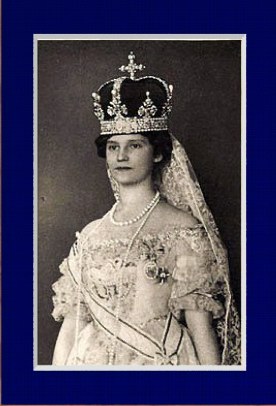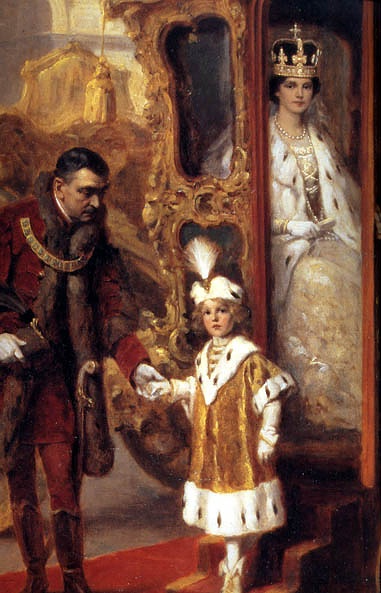Dedication:  (Volume II)
(Volume II)
 The first volume of this book was dedicated with profound respect to His Imperial and Royal Highness Archduke Rudolph of Austria, Knight of the Golden Fleece. His superb example of imperial and princely grace and my relationship with him created and refined my interest in the field of nobility and royalty, especially as it relates to the international law that preserves the supreme legal right to rule.
The first volume of this book was dedicated with profound respect to His Imperial and Royal Highness Archduke Rudolph of Austria, Knight of the Golden Fleece. His superb example of imperial and princely grace and my relationship with him created and refined my interest in the field of nobility and royalty, especially as it relates to the international law that preserves the supreme legal right to rule.
Archduke Rudolph was the finest man that I ever knew. Thus, the first book was dedicated to the honor of this great man and the laws that uphold non-territorial, de jure sovereign rights.
This second volume is dedicated to his mother, the Empress Zita. I met her as a result of the effort to reclaim property that was confiscated by the Nazi government of Austria in 1938. The following is a memory of an audience that I had with the de jure Empress of Austria:
I was summoned to an unforgettable audience with Empress Zita in a majestic castle during the summer of 1983. She was there to visit with a high-ranking Bavarian nobleman. I had motored there for many hours from Vienna where I was working on the confiscation case. When I reached the castle, I beheld a magnificent building in a Germanic Gothic style. I was received in the main entrance that had a magnificent two-storied high ceiling hall with multiple fireplaces. A circular staircase enclosed a turreted tower at one end of the hall. Numerous servants lined the hall, and one footman in livery bade me to wait.
After some 20 minutes, the butler appeared and waited at the bottom of the circular staircase. Then a door creaked open from upstairs. The butler resolutely announced, "Her Imperial and Royal Apostolic Majesty, the Empress and the Queen."
Empress Zita swept dramatically down the circular stairway, glancing neither to the left nor the right. She was elderly with white hair. With the aid of a cane, she walked very erect for a person of her age. Dressed in black from head-to-toe, the dark color was relieved only by a magnificent opera-length pearl necklace, the Order of the Starry Cross on her breast, and the Sash and Star of the Dame Order of Elizabeth across her shoulder. Empress Zita seemed timeless, and she was incarnate the representation of imperial majesty. Her imperious manners made it immediately clear that despite all the challenges that fell on the Imperial family, she remained the Empress and the Crowned Apostolic Queen of Hungary.
She was as least as tall as her two sons with whom I was most familiar, Archdukes Charles and Rudolph. There was not an ounce of fat on her body. As she passed before us, everyone in the hall bowed low. The butler then opened the door to a drawing room and bowed as the Empress entered.
In the center of the drawing room was a large armchair upon which the Empress sat. Both of her arms lay on the armrests. She gestured to the butler, and he then bade me to enter.
As I entered the drawing room, the butler announced me. I bowed three times in accordance with tradition. The first bow was upon entering the drawing room; the second bow was as I approached the center of the room. The final bow was as I approached Empress Zita.
With regal seriousness, she graciously inquired about the purpose of my audience. I explained that I was the young lawyer from the United States who had been recommended by the good Brother Benno, and that I had devised a legal strategy for the recovery of the confiscated Habsburg property.
A knowing look came into Empress Zita's eyes, and her countenance immediately changed. Recognizing the importance of my visit, she bade me to be seated and was clearly eager to receive details.
She was interested to learn that I was a Baca by blood from New Mexico -- a direct descendant of Alvar Nuñez Cabeza de Baca, the Spanish knight, who discovered New Mexico in 1536 for the Habsburg Spanish Crown. She not only knew exactly who Cabeza de Baca was, but she also knew about my remote ancestor, the shepherd Martin Alhja, who in 1212 told King Alfonso VIII of Castile that the Moors were encamped at a place known as cabeza de vaca. This enabled King Alfonso to surprise the Moors and win the great Christian victory of the Battle of Navas de Tolosa on 16 July 1212. This allowed northern Spain to be liberated of the Moors. Martin Alhja was ennobled on the battlefield by Alfonso VIII and given the surname of Cabeza de Baca as an honourable augmentation in recognition of his feat.
Empress Zita was intrigued to learn that my quest first began at age three when I saw a large Habsburg Double Eagle carved onto the door of the old Spanish Governor's Palace in Santa Fé, New Mexico. I knew my direct descent from the Spanish Conquistador, Alvar Nuñez Cabeza de Baca, and had striven to repeat the feat of my ancestor in serving the Imperial House.
This was, in fact, the actual origin of this case. My personal quest was to recover their entailed private family property that was confiscated in 1919 by the revolutionary Austro-Marxist Government. The same property was then returned under the 1936 Settlement Agreement with the Christian Dollfuss-Schuschnigg governments, but it was immediately re-confiscated by the Nazis after the 1938 Anschluss. The post-war Austro-Marxist Government adamantly refused to return the property.
 Empress Zita's English was better than Archduke Rudolph's English, her son. Her voice was soft, and she spoke English with a British cutting glass accent. There was no Continental foreign accent. She was easily understandable and clearly had spoken English many times before. Her tone was gracious, and she conversed with me as if speaking to a loyal subject. Completely regal in manner, she did not need to wear an actual crown to identify her as being a sovereign.
Empress Zita's English was better than Archduke Rudolph's English, her son. Her voice was soft, and she spoke English with a British cutting glass accent. There was no Continental foreign accent. She was easily understandable and clearly had spoken English many times before. Her tone was gracious, and she conversed with me as if speaking to a loyal subject. Completely regal in manner, she did not need to wear an actual crown to identify her as being a sovereign.
Her eyes lit up when I explained how I had turned the socialist-inspired European Convention of Human Rights against the Socialists in my legal theory for recovery of the confiscated private Habsburg property. A smile crossed her face as she exclaimed, "Touché!"
As I fully relayed the legal theory that I was pursuing, her smile grew brighter. She remarked, "My eyes are not as good as they used to be, and I cannot follow all of the details." But, despite being in her 90's, she was not the least bit senile. Instead, she was very alert and clearly in the possession of all of her faculties.
From the questions that she asked about the case, she was clearly well-informed. I explained the necessity of exhausting all administrative remedies in the Austrian courts before we could take the case to the European Commission on Human Rights in Strasbourg. France.
Her actions toward me were very gracious. But the Empress was not, however, the neighbor-next-door or the average person at the local pub. She was ever the sovereign. That said, she still laughed when I told her how a mentally-challenged person had oinked like a pig at her son, Archduke Rudolph. She clearly enjoyed a sense of humor.
Overall, her mannerisms were those to be expected of a crowned European Head of State. She would occasionally give a slight wave of her arm to indicate approval. The balance was struck between being regal and gracious without being the least bit condescending.
Having now explained the case to her in detail, the Empress understood perfectly and bade me to remain to dine with her. Three wines were served in the multi-course dinner at the castle. The first was a white wine with the fish, a subsequent red wine with the entrée, and a final sparkling wine with dessert. Afterwards, we had coffee.
After an enchanted evening, she remarked that she was aware of the aforementioned historic services that my ancestor provided to Holy Roman Emperor Charles V in the discovery of Nuevo México as a new realm of the Habsburg Empire. The Empress graciously added that, "by your perseverance and fidelity, indeed, you have proven yourself worthy of the Conquistador blood of your own ancestor, a Spanish Knight in service to the Arch-House." I felt overwhelmed.
On bent knee, I kissed in knightly fidelity the extended hand of the imperious Empress of Austria and Crowned Queen of Hungary. Her Imperial and Royal Apostolic Majesty reminded me ever so much of my own Catholic grandmother in El Reinato in New Mexico. This was still the northernmost province of El Virreinato de Nuevo España that my direct ancestor, the Spanish Conquistador, Alvar Nuñez Cabeza de Baca, discovered in 1536.
These events further inspired the three-year old in me. This inspiration ultimately started me on a path that led to my knighthood and the study and practice of international law, including completing a Master of Laws thesis on de jure, non-territorial sovereignty.
-----Stephen Kerr y Baca, JD, LLM, MAT, Full Professor and Legal Adviser to The International College of Interdisciplinary Sciences, and Baron of Ardgowan
If you have any questions or comments, please contact us at:
 The first volume of this book was dedicated with profound respect to His Imperial and Royal Highness Archduke Rudolph of Austria, Knight of the Golden Fleece. His superb example of imperial and princely grace and my relationship with him created and refined my interest in the field of nobility and royalty, especially as it relates to the international law that preserves the supreme legal right to rule.
The first volume of this book was dedicated with profound respect to His Imperial and Royal Highness Archduke Rudolph of Austria, Knight of the Golden Fleece. His superb example of imperial and princely grace and my relationship with him created and refined my interest in the field of nobility and royalty, especially as it relates to the international law that preserves the supreme legal right to rule. Empress Zita's English was better than Archduke Rudolph's English, her son. Her voice was soft, and she spoke English with a British cutting glass accent. There was no Continental foreign accent. She was easily understandable and clearly had spoken English many times before. Her tone was gracious, and she conversed with me as if speaking to a loyal subject. Completely regal in manner, she did not need to wear an actual crown to identify her as being a sovereign.
Empress Zita's English was better than Archduke Rudolph's English, her son. Her voice was soft, and she spoke English with a British cutting glass accent. There was no Continental foreign accent. She was easily understandable and clearly had spoken English many times before. Her tone was gracious, and she conversed with me as if speaking to a loyal subject. Completely regal in manner, she did not need to wear an actual crown to identify her as being a sovereign.